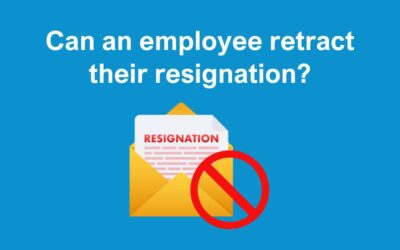In an ideal world, the workplace would be a harmonious place with employees and managers working together peacefully. However, this sadly isn’t always the case and employee complaints are bound to happen.
Whether a grievance is related to a particular work situation, coworker behaviour, or general dissatisfaction with the company policies, employees can have various grievances. When an employee complaint is not addressed, it can lead to a decrease in morale, productivity, and even result in legal issues for the organisation.
Therefore, when an employee has a complaint, both the manager and the HR department have integral roles to play in reaching a solution which is fair, reasonable and practical. Here’s a closer look at how the process should work, and how everyone can play a part in resolving any employee complaints.
Role of Managers in Resolving Employee Complaints
Managers are the first line of defence when it comes to resolving any disputes in the workplace. They should have open communication with their employees and be approachable when an employee has an issue.
Identifying the problem
In many cases, the warning signs will be present long before the employee voices their dissatisfaction. This could be a drop in performance, attendance, a negative attitude, or the persistent raising of a specific subject.
By nipping any problems in the bud before they arise, a manager may be able to prevent a full blown complaint from developing.
At this stage, employee complaints can be tackled informally. For example, the manager and member of staff having a chat in a private location. The tone should be non-confrontational, supportive and concerned. This can be a good way to see if the employee is willing to discuss anything which is bothering them.
It’s important not to dismiss concerns, even if they seem trivial or superficial. Make the employee feel as if you’re really listening to what they have to say. By doing this, you may be able to prevent matters from going further. In some cases, you may not be able to offer a magic solution, but knowing that they’ve been able to air their concerns, and have an honest discussion may be enough in some cases to stop resentment building up.
A formal complaint
If you don’t deal with employee complaints the grievance may spread to other employees.
Once a formal complaint has been raised, the process should follow the documented company procedure. Failure to do so could result in a successful tribunal case for the employee at a later stage.
If the grievance involves the line manager in any way, they must not become involved in the investigation or assessment, or attempt to unduly influence it. Later on, when a resolution is being sought, it may be appropriate for them to contribute.
You may be in a position where the employee complaints are nothing to do with the department or manager, but about the company’s policies overall. For example, an employee’s line manager may be involved in the process. In some cases this may even be preferable as you will have a much better understanding of any other factors which could be influencing the situation.
The Role of HR
The HR department plays a vital role in resolving a grievance. They are responsible for ensuring that the company’s policies and grievance procedures are followed, and all employees are treated fairly. When employee complaints becomes formal, HR should be involved straight away. They should be the people responsible for co-ordinating the action and reaching a fair decision.
The HR team will have the necessary knowledge about the rights of the employee, and the correct process that should be followed. This is such as a formal invitations to a meeting, and the right to have representation. It’s imperative that the employee is made aware of their rights, in order to avoid any claims at a later stage. In addition, HR’s input into the process is essential.
HR consultants should attend the meetings, and record what’s said before reaching a decision about employee complaints.
The goal is always to resolve matters taking into account what’s fair for the individual making the complaint, their colleagues and the company as a whole.
Where the grievance is about the conduct of another individual, or their manager, HR should consider not just whether the complaint is justified, but whether any training is required to prevent a recurrence.
Conclusion
In the early stages, the manager is very much responsible for taking the lead. They should be trying to proactively help the employee to communicate anything they are unhappy about. It may not always be obvious so managers need to be alert for any minor changes in behaviour and performance. If employee complaints escalates, the lead should typically be taken by HR. They can ensure the right process is followed, and that the outcome is not only fair and unbiased, but can also identify any further training or coaching which needs to take place.
Contact Us
For more information contact us at The HR Booth on 01383 668178 or email us at info@thehrbooth.co.uk







